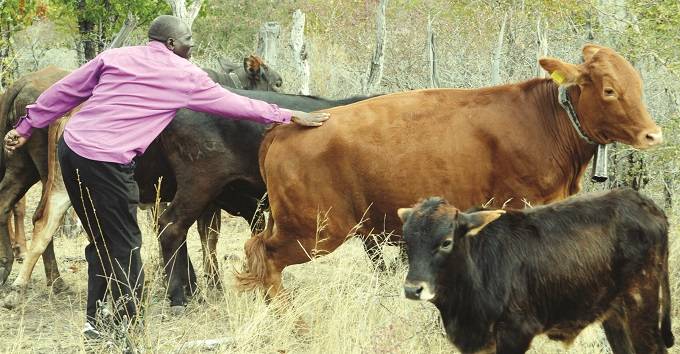Farmers must work around El Nino to reduce drought effects

Elita Chikwati
Last year will be remembered in the history of the country for attaining the highest tobacco production levels ever since the growing of the golden leaf commenced.
There were also no grain imports as the country had enough grain in stock.
In 2018, farmers continued to benefit inputs under the Government programmes, Command Agriculture and the Presidential Inputs Scheme.
Farmers were however affected by the high cost of inputs as retailers hiked prices of seed and fertilisers.
Government had to intervene, forcing manufacturers to reduce prices.
Some farmers still feel the prices are still high and unviable prompting others, especially those who grow export crops, to get their payments in foreign currency so they remain in business and also manage to buy machinery.
The forecast of an El Nino during the 2018/19 season was not so welcome and Government and responsible authorities are already working on mitigation measures.
The delays in the rain and increase in the prices of the input costs did not dampen the farmers’ spirits as they have continued to farm.
Tobacco
The tobacco sector did well despite the resurgence of the Potato Virus (PVY). The sector registered 252 million kilogrammes of flue cured tobacco which is the highest in the history of the country.
The previous record was 237 million kg, which was achieved in 2000.
The increase in tobacco production has been attributed to high prices and an organised market, availability of funding through contractors and Government.
Tobacco has earned a strategic position in the economy because of its contribution to the Gross Domestic Product and foreign currency earnings.
Zimbabwe has become the major flue-cured tobacco producer in Africa and occupies fifth position in the world as many communal farmers joined the lucrative farming sector following the land reform programme.
There has also been an increase in the registrations of farmers growing the golden leaf.
According to the latest Tobacco Industry and Marketing Board statistics, by December 21, 167 100 farmers had registered to grow the golden leaf during the 2018/19 season marking a 48 percent increase from the 112 546 who had registered during the correspondence period last season. Of the 167 100 registered farmers, 40 414 were registering for the first time.
Tobacco disease (Potato Virus Y)
In 2018, stakeholders in the tobacco industry expressed concern over the resurgence of the Potato Virus Y, a disease that was last seen during the 1960s.
PVY is an aphid transmitted disease, which is threatening the industry. In 2018, there was an alarming increase in the volumes of tobacco infected by PVY.
The spread of the disease has been attributed to the delays by farmers to remove tobacco stalks within the stipulated dates to prevent the establishment and spread of the pests and diseases and also growing crops in the same family with tobacco on the same piece of land, which is not allowed.
The Plant Pests and Disease Act (Chapter 19:08) stipulates that tobacco plants that remain in the field must be destroyed by May 15 every year.
But according to Agritex, few farmers were complying with the law. Some stakeholders have called for stiffer penalties while others have also encouraged self-policing.
Command Agriculture
Government has continued to fund farmers under the Special Maize Import Substitution Programme, popularly known as the Command Agriculture.
The programme which started with maize was spread to wheat and livestock.
The Command Livestock programme has been characterised by the distribution of beef heifers. It aims to include dairy cattle, piggery, goats, sheep and poultry.
In 2018, the Government’s Command Livestock projects performed beyond expectations, with farmers already realising profits from the enterprises. Poultry farmers, who benefited from the Command Poultry project, have already sold their birds and realised profits.
Those in the Matabeleland region were given heifers. By August, over 29 000 heifers had been distributed in Matabeleland North Province, while over 1 400 heifers were distributed in Matabeleland South Province.
Command livestock is meant to augment the national herd. Command Livestock has generated a lot of excitement and demand is very high.
Farmers also started Command Fisheries and most of the beneficiaries were confident that they were going to register meaningful profits from the programme.
Government has so far distributed more than 3,5 million fish fingerlings countrywide under the Command Fisheries programme as it steps up efforts to transform rural communities and increase use of water bodies.
The programme aims at enhancing fish production in dams and commercial fish production in ponds and cages at grassroots level.
Maize stocks (Strategic Grain Reserve)
The intervention by Government through Command Agriculture, Presidential Inputs Scheme and hard work of self-financed farmers has resulted in the country not importing grain.
The country has enough grain stocks with the surplus enough to cater for the nation for nine months.
As at December 3, the maize stocks stood at 1 179 756 which is twice the mandatory strategic grain reserve of 500 000 tonnes. The country also had 135 935 tonnes of small grains in stock.
Cotton production
Government through Cottco continued to assist farmers in the cotton growing areas with inputs.
This is meant to resuscitate the textile industry, create jobs and also bring in the much need foreign currency.
Farmers have also applauded Government for the timely distribution of cotton inputs under the Presidential Free Cotton Inputs Scheme to revive the cotton industry.
This has also seen an improvement and uplifting of the standards of living of rural communities.
Planting was however affected in some areas due to the late rains.
El Nino
The Meteorological Services Department in August issued a seasonal rainfall outlook for the 2018/19 rainfall season.
According to the rainfall records from October 1 to December 12, 2018, most parts of the country had received less than 75 percent of the long-term mean rainfall and are thus in the below normal category.
Parts of Mashonaland, Masvingo, Matabeleland South and Manicaland provinces are in the normal category, having received total rainfall in the range 75 percent to 125 percent of their long-term mean.
During the next three months January to March 2019, for the whole country there is a 40 percent probability of rainfall amounts being in the normal category, a 35 percent probability of being below normal and a 25 percent chance of being in the above normal category. Overall, normal to below normal accumulated rainfall totals are expected across the country.
It is important that stakeholders work around the El Nino induced drought to reduce the negative effects on crops, livestock and the nation.
Government is encouraging farmers to produce small grains that are more tolerant to dry conditions.
The Presidential Inputs Scheme has included drought tolerant crops such as small grains, short and medium season varieties of maize.
Government is also working on irrigation rehabilitation, development and expansion.
There are interventions to develop 200 hectares of irrigation per every district.
The country also has early warning information system and drought monitoring.
Agritex fortnightly report will help the nation especially farmers track the season so that the country is forewarned in the event of any danger.
Farmers are encouraged to harvest and store forage particularly in areas where there is decent vegetation.
Livestock sector
From the summer of 2017 into 2018 the country lost 50 000 cattle to tickborne specifically January disease (Theileriosis).
The disease is caused by the brown tick and is found in almost all our districts because of non-dipping. Some households losing their entire herds.
The worst affected districts were Goromonzi, Marondera, Chikomba, Wedza, Buhera, Chivhu, Gutu, Chegutu, Centenary, Bindura and Shamva.
The Department of Veterinary Services advised farmers to start intensive dipping (weekly dipping) to interrupt the breeding cycle of ticks and prevent a build-up of tick population in the veld.
Farmers should also ensure their livestock attend all dipping sessions provided for by Government in the communal sector and pay dipping fees to facilitate constant supply of dipping chemicals.
It is not allowed to move tick-infested cattle from one area to another as this will aid the spread of tick-borne diseases. Commercial farmers should stock adequate dipping chemicals for the rainy season and ensure they dip their animals weekly.











Comments